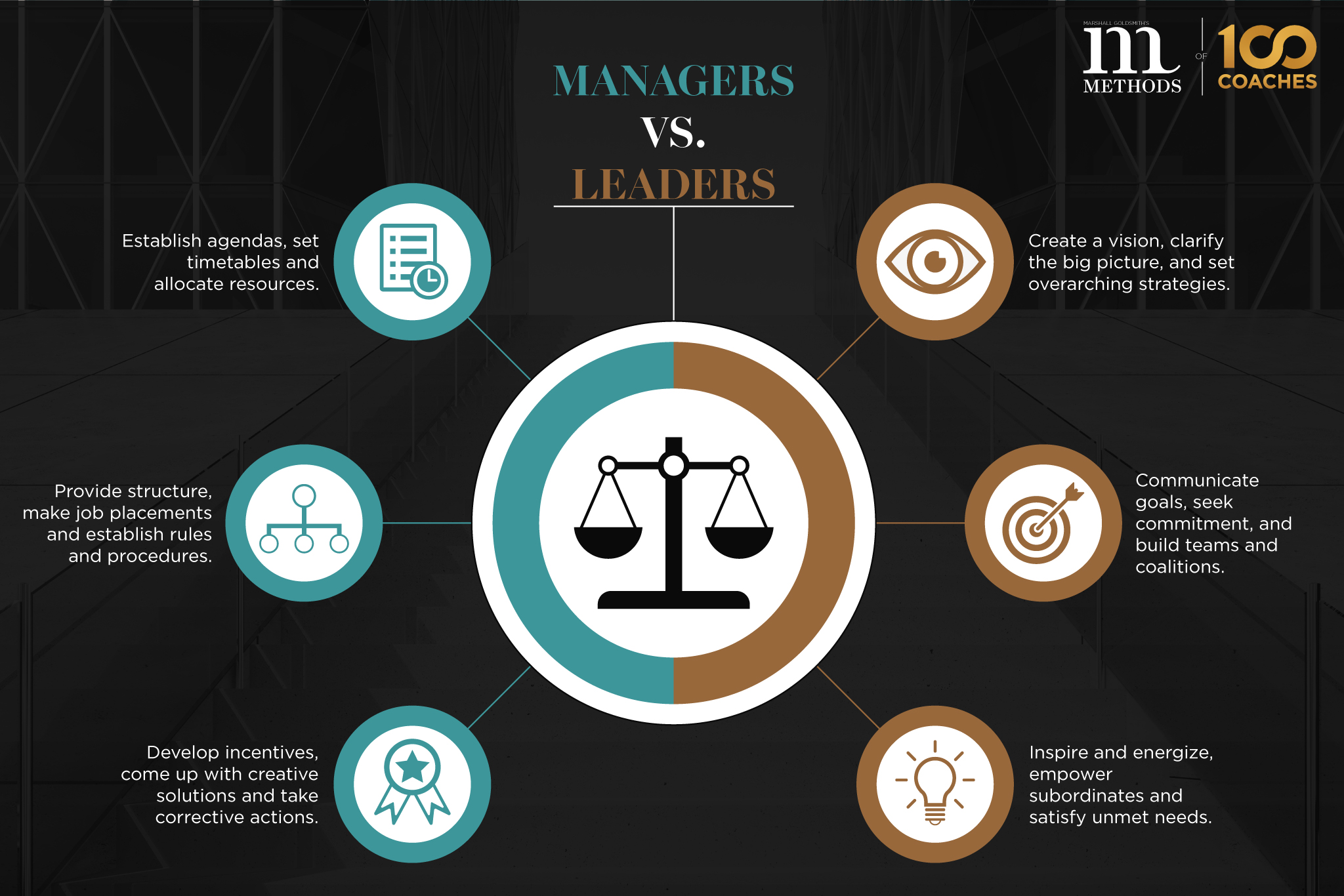As business professionals, we’re all very familiar with the terms “leadership” and “management.” We hear them thrown around all the time, and it seems like the last 10 years have brought about a huge influx of authors and thought leaders who are all touting their own unique view of how these two things should be done.
Generally, this is a good thing: a world with better leaders and managers will be a better world for all. But do we really know what these terms mean? If a random person off the street were to come up to you and ask you to explain the difference between “management” and “leadership,” what would you say? If you’re anything like most people, you’d probably just shrug and say something like “there isn’t one,” or “leadership is what you call the top-dog positions like CEO.” This is no surprise, given that in typical, casual conversation, the terms are often used interchangeably with either one simply meaning “the people in charge,” or “the authority figure at a given job.”
If you’re unlike most people, you might even be able to articulate a few basic premises, such as: managers are involved at the one on one level, while leadership typically involves high level thinking. You wouldn’t necessarily be wrong, but perhaps just unspecific.
The truth is, the two concepts share much in common, and in a general sense, they both deal with utilizing human potential to help organizations and companies achieve positive business outcomes. Now, that’s a nebulous mouthful, and the very brand of double-talk that leads many people to think both leadership and management is a load of hooey. But, we know it’s not; countless studies have proven how crucial effective leadership and management is. So, let’s examine.

The first thing that’s important to note is that for a long time, many people thought these two concepts one and the same. And, as mentioned earlier, it’s still quite a commonly held belief, albeit only an unexamined one.
Since the inception of his groundbreaking theories in the 20th century, author and business thought leader John Kotter has made a career out of helping people understand the differences between management and leadership, and his many books on the topic offer illuminating insights as to how each are separate but equally important, and dependent on one another for total successful operation of a business.
To paraphrase him, he defines leadership’s central function as being to produce change and movement through a vision, whereas management’s role is to create order and consistency through processes and daily administration of work. You can also think of it in these simple (but limited) terms: leaders create a vision, managers create deadlines.
From a logical standpoint, we can make this distinction: all managers are “leaders” of some sort (in the informal sense of the word because they direct people toward action and observe and measure results), but not all leaders are “managers” — that is to say, not all leaders engage in management activities.
In fact, they rarely do; it has become a popular theory amongst leadership thinking that leadership should specifically always avoid management activities, or getting too much in the weeds.
As countless books and studies have shown, leaders are most effective when they are operating in their proper realm, outside of the day-to-day, low-level activities. And this is precisely why management and leaderships cannot be decoupled from one another. They exist in symbiosis, with one relying on the other for successful functioning.
The best leaders know how to see clearly the overall goals of the organization and how to delegate them to managers; the best managers know how to carry out directives from above in the most efficient way possible.
In order to further distinguish these two concepts, let’s look at a few specific activities unique to each position as taken from this article, based off Kotter’s work.
Managers on a regular basis, will often be involved in these types of things:
- Establishing agendas, setting timetables, allocating resources. Some applicable examples of management activities might be:
- Create deadlines for specific, small actions. Sales managers, for instance, are in charge of making sure each salesperson is hitting their quota for the given time period.
- Providing structure, making job placements, establishing rules and procedures. Some applicable examples of management activities might be:
- Hiring individuals for their teams, creating employee handbooks, creating processes for how certain actions are done.
- Developing incentives, coming up with creative solutions, taking corrective actions. Some applicable examples of management activities might be:
- Disciplining employees who aren’t hitting their marks, offering bonuses to high-performing individuals, and employing local solutions that are unique and innovative.
Leaders, on a regular basis, will often be involved in these types of things:
- Creating a vision, clarifying a big picture, setting overarching strategies to achieve these. In other words, they see “the forest” and not the trees; they’re focused on the big picture, not the small. This can look like:
- Creating the “vision/mission statement” that is used as the company’ guiding light; their True North, from which every action stems.
- Communicating goals, seeking commitment, and building teams and coalitions. This can look like:
- Organizing executive teams and hiring at the highest level in order to make sure the right people are in the right positions.
- Inspiring and energizing, empowering subordinates, and satisfying unmet needs. This can look like:
- Inspiring company employees with rousing speeches, coaching people through tough times with positive influence, and making sure the company culture is a welcoming place for all people.
In an ever-changing, increasingly-fast world, we need strong doses of both, but as time moves on, it seems that popular theory seems to value increasing our leadership skills as opposed to our management ones. Many current business theorists encourage managers themselves to be more leader-like, with the emphasis on employee motivation and soft skills, which in turn creates a spirit of “leaders creating more leaders.”
In a perfect scenario, every single person up and down the organization would be perfectly motivated to do their best work day in and day out, and be so smart that they never need assistance or guidance. We know this isn’t true, but it doesn’t mean we can’t strive for something like that. Especially as technology innovation continues on its current upward trend, we’ll see more and more low-level daily processes automated out by machines, and thus the need for management of small, individual activities will dwindle.
The need for logic/process based thinking will be given over to computing, and the human mind will be most necessary for creativity — strategic, abstract thinking that will help guide the organization toward the future. In a way, we can think of management as a very grounded and concrete process, dealing in facts, figures, and tangible outcomes, and leadership as being more nebulous, dealing in complex though and abstractions, leading to high-level thoughts.
Because of this, programs like Methods offer high-quality, interactive leadership training for the next generation of business. Our deep talent bench of instructors feature some of the world’s most renowned business thought leaders and executive coaches, with a heavy focus on leadership for the future. With courses like these, anyone can become a great leader.
All in all, though the differences to some may seem slight, both management and leadership are absolutely imperative for business success and creating sustainable high functioning teams and have their own sets of unique challenges.
No organization can survive without good leadership at the top, driving the company forward with a strong vision and purpose — nor can they function effectively on a day-to-day basis without strong, competent management of activities and outcomes at each level of operation.





